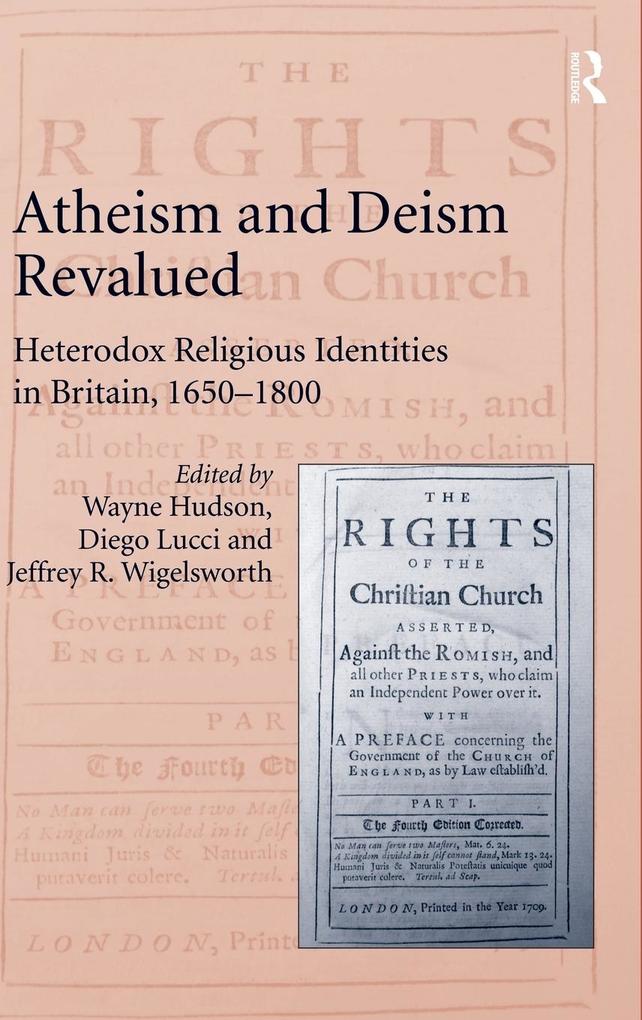
Zustellung: Di, 15.07. - Fr, 18.07.
Versand in 7 Tagen
VersandkostenfreiBestellen & in Filiale abholen:
Given the central role played by religion in early-modern Britain, it is perhaps surprising that historians have not always paid close attention to the shifting and nuanced subtleties of terms used in religious controversies. In this collection particular attention is focussed upon two of the most contentious of these terms: 'atheism' and 'deism', terms that have shaped significant parts of the scholarship on the Enlightenment. This volume argues that in the seventeenth and eighteenth century atheism and deism involved fine distinctions that have not always been preserved by later scholars. The original deployment and usage of these terms were often more complicated than much of the historical scholarship suggests. Indeed, in much of the literature static definitions are often taken for granted, resulting in depictions of the past constructed upon anachronistic assumptions. Offering reassessments of the historical figures most associated with 'atheism' and 'deism' in early modern Britain, this collection opens the subject up for debate and shows how the new historiography of deism changes our understanding of heterodox religious identities in Britain from 1650 to 1800. It problematises the older view that individuals were atheist or deists in a straightforward sense and instead explores the plurality and flexibility of religious identities during this period. Drawing on the most recent scholarship, the volume enriches the debate about heterodoxy, offering new perspectives on a range of prominent figures and providing an overview of major changes in the field.
Inhaltsverzeichnis
Chapter 1 Introduction, Wayne Hudson, Diego Lucci, Jeffrey R. Wigelsworth; Chapter 2 Atheism and Deism Demythologized, Wayne Hudson; Chapter 3 Thomas Hobbes, 'Father of Atheists', Jeffrey R. Collins; Chapter 4 Deism, Biblical Hermeneutics and Philology, Luisa Simonutti; Chapter 5 The Undivulged Event in Toland's Christianity Not Mysterious, Ian Leask; Chapter 6 Collins's Cicero, Freethinker, Giovanni Tarantino; Chapter 7 Blasphemy in the Eighteenth Century, James A. Herrick; Chapter 8 William Wollaston's Religion of Nature, Diego Lucci; Chapter 9 'God can require nothing of us, but what makes for our Happiness', Jeffrey R. Wigelsworth; Chapter 10 'God always acts suitable to his character, as a wise and good being', Jeffrey R. Wigelsworth; Chapter 11 'Atheists or Deists, more charitable than superstitious Zealots': Alberto Radicati's Intellectual Parabola, Tomaso Cavallo; Chapter 12 Was Hume an Atheist?, Keith E. Yandell; Chapter 13 Henry Dodwell the Younger's Attack on Christianity, Diego Lucci; Chapter 14 Gibbon's Heterodoxy, Charlotte Roberts; Afterword, Margaret C. Jacob;
Produktdetails
Erscheinungsdatum
28. November 2014
Sprache
englisch
Seitenanzahl
296
Autor/Autorin
Wayne Hudson, Diego Lucci
Verlag/Hersteller
Produktart
gebunden
Gewicht
611 g
Größe (L/B/H)
240/161/21 mm
ISBN
9781409456803
Entdecken Sie mehr
Bewertungen
0 Bewertungen
Es wurden noch keine Bewertungen abgegeben. Schreiben Sie die erste Bewertung zu "Atheism and Deism Revalued" und helfen Sie damit anderen bei der Kaufentscheidung.









